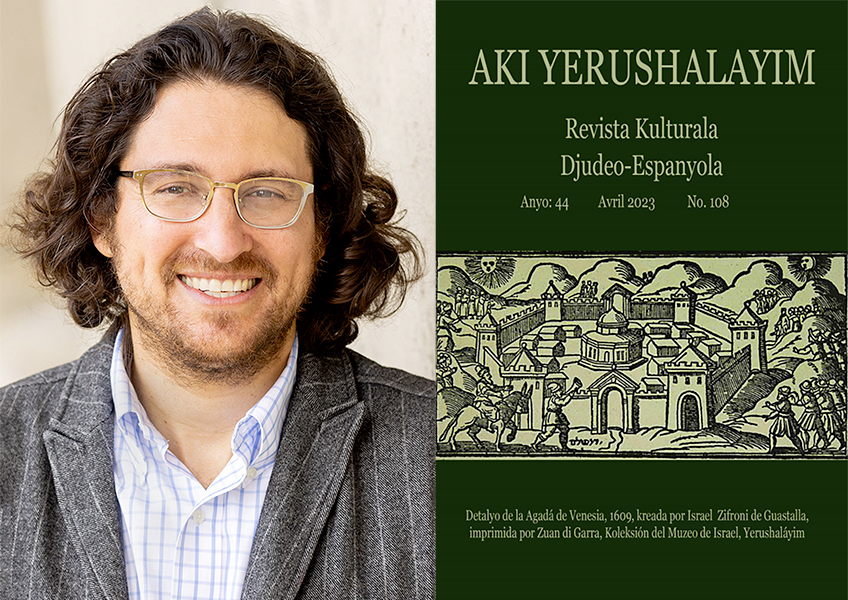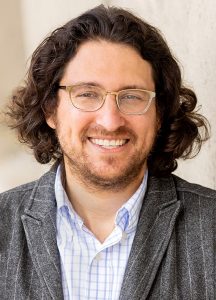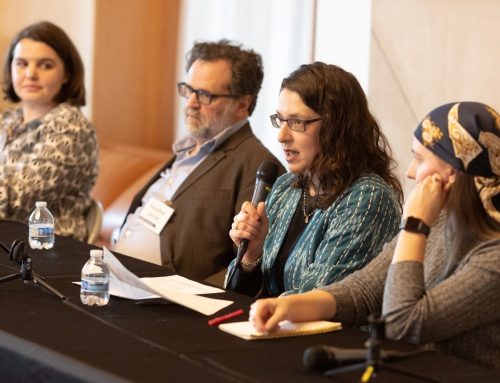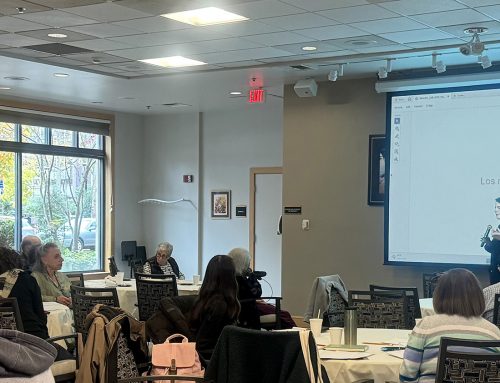
Devin E. Naar and Aki Yerushalayim’s book cover
While the world was still navigating pandemic-induced isolation in the spring of 2021, the National Authority for Ladino (NAL) in Jerusalem invited select Ladino activists and scholars across the world to virtually come together and present original short stories, written in Ladino, in celebration of Passover. The compositions had two requirements: that the stories relate to Passover themes such as liberation (or its absence), and that they feature a Ladino refran, or proverb. Among those whom the National Authority invited to compose and present an original Ladino composition was Devin E. Naar, the Isaac Alhadeff Professor of Sephardic Studies at the University of Washington.
Entitled “Dos Ijikos i sus Nono” (‘Two Children and their Grandfather’), Naar’s short story imagines a scene with two boys strolling along the shore with their grandfather, discovering the promises and costs of immigration, the preservation of one’s culture across generations, and what it means to speak to those closest to you in a language not your own.
Are the two boys inspired by Naar, his brother and their relationship with their Nono? Perhaps.
Are the characters of the two boys inspired by Naar’s own sons? Perhaps.
Aki Yerushalayim, published by the NAL and edited by Aldo Sevi, featured Naar’s story in the April 2023 issue, which also acknowledges and mourns the loss of two luminaries of Ladino scholarship and cultural activism: Moshe Shaul and Tamar Alexander.
Devin E. Naar hopes to ultimately share “Dos Ijikos i sus Nono” in English, and to inspire others to create their own original compositions in Ladino.
 Devin E. Naar is the Isaac Alhadeff Professor in Sephardic Studies, Associate Professor of History, and faculty at the Stroum Center for Jewish Studies in the Jackson School of International Studies at the University of Washington. Born and raised in New Jersey, Dr. Naar graduated summa cum laude from Washington University in St. Louis and received his Ph.D. in History at Stanford University. He has also served as a Fulbright fellow to Greece. His first book, Jewish Salonica: Between the Ottoman Empire and Modern Greece, was published by Stanford University Press in 2016. The book won the 2016 National Jewish Book Award in the category of Research Based on Archival Material and was named a finalist in Sephardic Culture. It also won the 2017 Edmund Keeley Prize for best book in Modern Greek Studies awarded by the Modern Greek Studies Association.
Devin E. Naar is the Isaac Alhadeff Professor in Sephardic Studies, Associate Professor of History, and faculty at the Stroum Center for Jewish Studies in the Jackson School of International Studies at the University of Washington. Born and raised in New Jersey, Dr. Naar graduated summa cum laude from Washington University in St. Louis and received his Ph.D. in History at Stanford University. He has also served as a Fulbright fellow to Greece. His first book, Jewish Salonica: Between the Ottoman Empire and Modern Greece, was published by Stanford University Press in 2016. The book won the 2016 National Jewish Book Award in the category of Research Based on Archival Material and was named a finalist in Sephardic Culture. It also won the 2017 Edmund Keeley Prize for best book in Modern Greek Studies awarded by the Modern Greek Studies Association.





